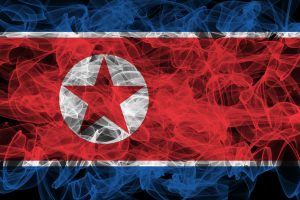A spokesperson of the North Korean Foreign Ministry issued a statement denouncing the United States’ moves to “demonize” the North.
“The military and political situation on the Korean Peninsula and in the region has reached an extreme red-line due to the reckless military confrontational maneuvers and hostile acts of the U.S. and its vassal forces,” the spokesperson said in a statement published by the North’s state-controlled media, Korean Central News Agency (KCNA), on Thursday.
The statement was published two days after U.S. Defense Secretary Lloyd Austin had meetings with South Korean President Yoon Suk-yeol and Defense Minister Lee Jong-sup in Seoul.
Accusing the United States of demonizing North Korea, the spokesperson also said that Washington “is intensifying the full-scale offensive of putting pressure on DPRK in all aspects including ‘human rights,’ sanctions and military affairs.” (DPRK is an acronym of the North’s official name: Democratic People’s Republic of Korea.)
Last week, U.S. President Joe Biden nominated Julie Turner as special envoy on North Korean human rights issues – a post that had remained vacant for six years. Both then-U.S. President Donald Trump and South Korean President Moon Jae-in did not appoint representatives to tackle the North’s dire human rights issues, preferring to focus on their initiatives to denuclearize North Korea while they were in office. Now, Seoul and Washington will likely raise their voices on the North’s human rights issues, as both the Biden and Yoon administrations have appointed special envoys to highlight one of the most sensitive issues for North Korea.
Despite abundant evidence pointing out severe human rights violations within one of the most isolated countries in the world, Pyongyang has denied the accusations while demanding that outside countries not violate its sovereignty. Given the difficulty in accessing objective information on human rights issues in North Korea, there have been concerns over the lives of ordinary North Koreans, especially after the COVID-19 pandemic broke out in late 2019.
In his visit to Seoul, Austin reassured that the United States would make its full commitment to the defense of South Korea through deploying U.S. strategic assets such as its fifth-generation F-22 and F-35 fighter jets, and scaling up the combined military drills with South Korea. As joint military exercises are one of the “hostile policies” North Korea has demanded the United States to withdraw, the North Korean Foreign Ministry spokesperson heralded Pyongyang’s future actions against the U.S. and the South’s military moves.
“First, the DPRK will take the toughest reaction to any military attempt of the U.S. on the principle of ‘nuke for nuke and an all-out confrontation for an all-out confrontation!’” the spokesperson said. This is an old-school policy of North Korea linked with its “strength to strength” strategy toward the United States and South Korea. While showing off its “counteraction strategy” prepared for “any short- and long-term scenario attempted by the U.S. and its vassal forces,” the spokesperson also said that the North will make “clearer” deterrence measures “if the U.S. continues to introduce strategic assets into the Korean Peninsula.”
The measures North Korea will likely make in the upcoming months include tests of a solid-fuel intercontinental ballistic missile (ICBM), military reconnaissance satellite, and other advanced long-range ballistic missiles, such as a submarine-launched ballistic missile (SLBM). As Kim Jong Un has vowed not to give up his nuclear weapons in any circumstances, Pyongyang will ramp up its efforts to develop more powerful long-range nuclear weapons, rather than launching high numbers of short-range ballistic missiles as it did last year.
After making clear its deterrence capabilities over the U.S. military moves in the region, the spokesperson also said that Pyongyang is not interested in any dialogue with Washington.
“Second, the DPRK is not interested in any contact or dialogue with the U.S. as long as it pursues its hostile policy and confrontational line,” the spokesperson said. Washington has made clear that it “harbors no hostile intent” toward Pyongyang and repeatedly urged it to return to the negotiating table with “no preconditions” since the Biden administration completed its policy review on North Korea in April 2021. Pyongyang views the references to dialogue as a “shameless” effort to gain time while “pursuing the most heinous hostile policy towards the DPRK.”
For Pyongyang, the devastating economic sanctions and extensive joint military drills between the South and the United States are clear proof of their so-called hostile intent. The spokesperson implied that the U.S. policy on North Korea centered on the complete, verifiable, and irreversible denuclearization (CVID) of the country is a unilateral and unfair offer that would have Pyongyang disarm itself while the U.S. “pursues the military expansion” with its allies. Reiterating the necessity of developing weapons to confront the U.S. in the region, the spokesperson added that the country’s deterrence measures will remain until the threats from the U.S. and its allies in the region “have been definitely rooted out.”
“The more dangerous the U.S. threat to the DPRK gets, the stronger backfire the U.S. will face in direct proportion to it,” the spokesperson said.
According to the South’s Defense Ministry, combined air drills between the South Korean and U.S. militaries were conducted on Wednesday. U.S. B-1B strategic bombers and F-22 and F-35B stealth fighters were mobilized with the South’s F-35A fighter jets during the drills. As Seoul and Washington on one hand, and Pyongyang on the other, vow to strengthen deterrence capabilities against each other, their “tit-for-tat” measures will likely be extensive – which would destabilize the region further.

































